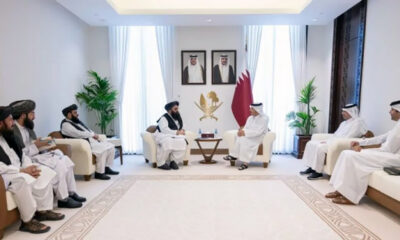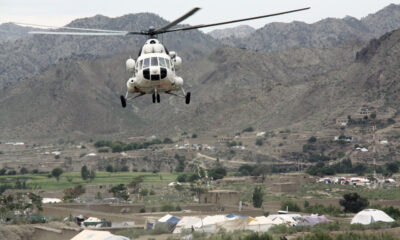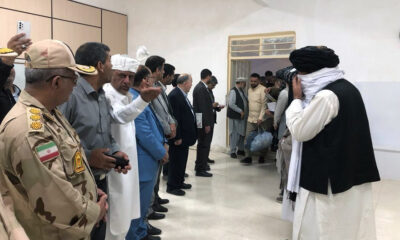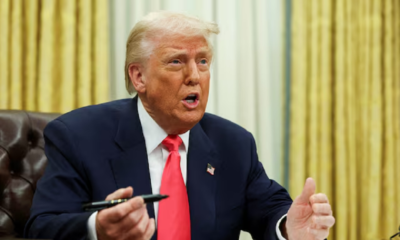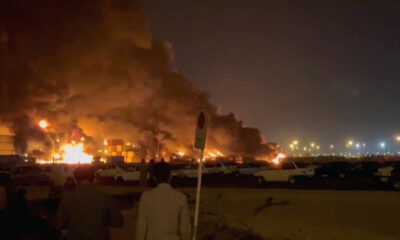Regional
Pakistan clinches last-gasp $3 billion IMF bailout
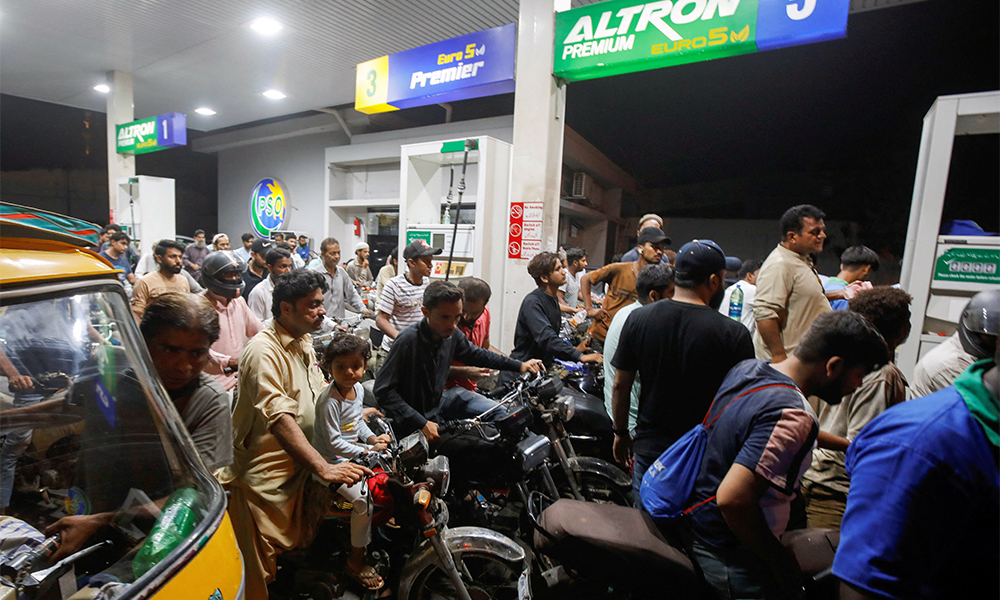
Pakistan secured a badly-needed $3 billion short-term financial package from the International Monetary Fund on Friday, giving the South Asian economy respite as it teeters on the brink of default.
In a long-awaited decision for Pakistan, the IMF said it had reached a staff-level deal with the 220 million nation, which will now be subject to approval by its board in July.
The new nine-month standby arrangement came hours before a current IMF agreement expires, offering relief to Pakistan, which is battling an acute balance of payments crisis.
Prime Minister Shehbaz Sharif said it would put Pakistan “on the path of sustainable economic growth”.
With sky-high inflation and foreign exchange reserves barely enough to cover one month of controlled imports, which analysts say Pakistan’s economic crisis could have spiraled into a debt default in the absence of an IMF deal, Reuters reported.
The deal came only after Sharif held marathon meetings with IMF head Kristalina Georgieva on June 22, which he said represented “a turning point” as the fund’s managing director had not initially appeared very forthcoming.
Pakistan will receive formal documents on the deal later on Friday, Finance Minister Ishaq Dar told Reuters, which he said he would “sign, seal and return by tonight”.
The new deal, which Dar said on Thursday was expected soon, will disburse an upfront amount of $1.1 billion shortly after the IMF board’s meeting in July, he said.
Dar said Pakistan aimed to take the central bank’s foreign exchange reserves to $14 billion by the end of July. “We have stopped the decline, now we have to turn to growth,” he added.
Pakistan’s sovereign dollar bonds were trading higher after the announcement, with the 2024 issue enjoying the biggest gains, up more than 8 cents at just above 70 cents in the dollar, according to Tradeweb data.
The gains were most pronounced in shorter-dated bonds, reflecting lingering skepticism over the longer-term fiscal outlook for the country.
The $3 billion IMF funding is higher than expected as it looks set to replace the remaining $2.5 billion from a $6.5 billion longer-term Extended Fund Facility agreed in 2019.
The deal will also unlock other bilateral and multilateral financing. Long-time allies Saudi Arabia, the UAE and China have already pledged or rolled over billions of loans.
“This will support near-term policy efforts and replenish gross reserves,” the IMF said.
The new arrangement builds on the 2019 programme, IMF official Nathan Porter said in a statement, adding that Pakistan’s economy had faced several challenges in recent times, including devastating floods and rising commodity prices.
“Despite the authorities’ efforts to reduce imports and the trade deficit, reserves have declined to very low levels. Liquidity conditions in the power sector also remain acute,” Porter said.
“Given these challenges, the new arrangement would provide a policy anchor and a framework for financial support from multilateral and bilateral partners in the period ahead.”
Porter also pointed out the power sector’s buildup of arrears and frequent power outages, Reuters reported.
Reforms in the energy sector, which has accumulated nearly 3.6 trillion Pakistani rupees ($12.58 billion) in debt, has been a cornerstone of the IMF talks.
The IMF said it would want steadfast policy implementation by Pakistan to overcome challenges, “particularly in the energy sector”, where it expects a rise in electricity prices.
Dar confirmed that the hike will come ahead of the IMF board review of the bailout, saying the rebasing to be done in July will make about three to four rupees a unit difference.
“Reform does not, must not, mean raising tariff endlessly,” Pakistan’s Minister for Power Khurram Dastgir told Reuters.
With the tenure of the current government ending in August, Dastgir said it had put in place an “aggressive medium-to-long-term plan” to increase renewable energy which was only possible if long-term assistance is available.
Reforms taken
Islamabad has taken measures demanded by the IMF since its mission arrived in Pakistan earlier this year, including revising its 2023-24 budget and a key policy rate hike to 22% in recent days.
It also got Pakistan to raise more than 385 billion rupee ($1.34 billion) in new taxation to meet the IMF’s fiscal adjustments.
The IMF said the central bank should remain proactive to reduce inflation and maintain a foreign exchange framework.
The painful adjustments have already fuelled all time high inflation of 38% year-on-year in May.
“The FY24 budget advances a primary surplus of around 0.4 percent of GDP,” Porter said, adding it will be important that the budget is executed as planned, and authorities resist pressures for unbudgeted spending or tax exemptions.
“This new programme is far better than our expectations,” said Mohammed Sohail of Topline Securities in Karachi, adding there while were a lot of uncertainties on what would happen after a new government comes to power it would “definitely help restore some investor confidence”.
‘Tough journey’ ahead
Meanwhile, on Friday night, Pakistan’s Prime Minister Shehbaz Sharif took to twitter and said while the IMF stand-by agreement “is a much-needed breather, which will help the country achieve economic stability, the nations are not built through loans. I pray for this new program to be the last one.”
He went on to thank Pakistan’s “friends & partners such as China, Saudi Arabia, UAE & Islamic Development Fund for standing by Pakistan at the time of massive economic challenges.
“Under a whole-of-the-government approach, we have worked out an Economic Revival Plan, which will focus on unlocking our strategic potential in agriculture, mine & minerals, defense production & information technology. The Plan will bring up investments of billions of dollars & create job opportunities for four million people.
“It may be a tough journey but as they say, ‘When the going gets tough, the tough gets going’,” he said.
Regional
Death toll from blast at Iran’s Bandar Abbas port rises to 40
Government spokesperson Fatemeh Mohajerani cautioned against “premature speculation”, saying final assessments would be shared after investigations.
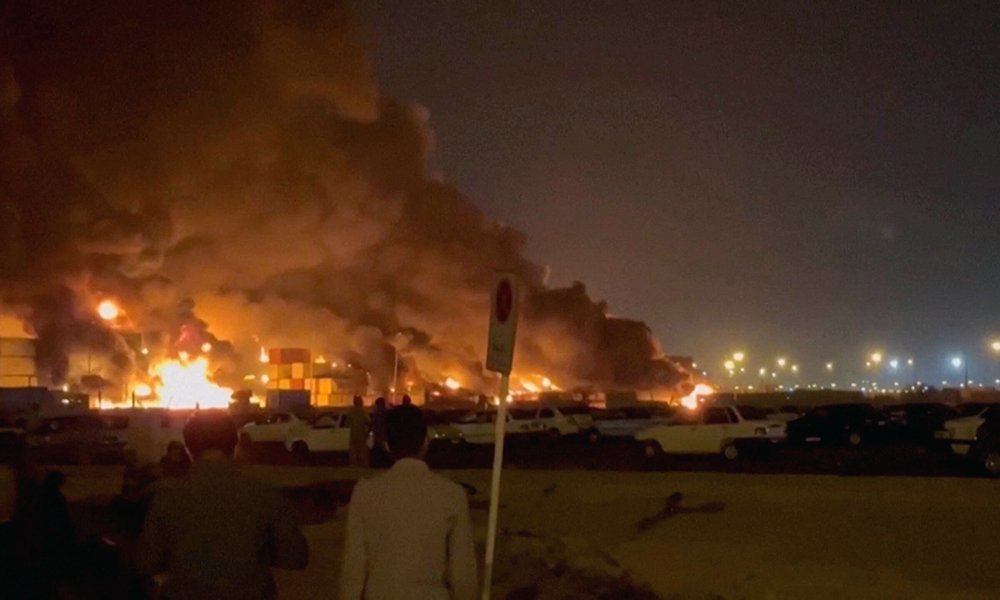
The death toll from a powerful explosion at Iran’s biggest port of Bandar Abbas has risen to at least 40, with more than 1,200 people injured, state media reported on Sunday, as firefighters worked to fully extinguish the fire, Reuters reported.
Saturday’s blast took place in the Shahid Rajaee section of the port, Iran’s biggest container hub, shattering windows for several kilometres around, tearing metal strips off shipping containers and badly damaging goods inside, state media said.
The incident occurred as Iran held a third round of nuclear talks with the United States in Oman.
Fires kept breaking out in different parts of the affected area as of Sunday night, according to state media, with helicopters and fire fighters continuing efforts to extinguish them.
Chemicals at the port were suspected to have fuelled the explosion, but the exact cause was not clear and Iran’s Defence Ministry denied international media reports that the blast may be linked to the mishandling of solid fuel used for missiles.
A spokesperson for the ministry told state TV the reports were “aligned with enemy psyops”, saying that the blast-hit area did not contain any military cargo.
The Associated Press cited British security firm Ambrey as saying the port in March had received sodium perchlorate, which is used to propel ballistic missiles and whose mishandling could have led to the explosion.
The Financial Times newspaper reported in January the shipment of two Iranian vessels from China containing enough of the ingredient to propel as many as 260 mid-range missiles, helping Tehran to replenish its stocks following its direct missile attacks on its arch-foe Israel in 2024.
Plumes of black smoke rose above the site on Sunday and pieces of twisted metal and debris lay scattered across the blast site, read the report.
By early afternoon, the head of Iran’s Red Crescent Society told state media the fire was 90% extinguished and officials said port activities had resumed in unaffected parts of Shahid Rajaee.
A spokesperson for the country’s crisis management organisation appeared on Saturday to blame the explosion on poor storage of chemicals in containers at Shahid Rajaee, adding that earlier warnings had highlighted potential safety risks.
Government spokesperson Fatemeh Mohajerani cautioned against “premature speculation”, saying final assessments would be shared after investigations.
Negligence has often been blamed in a series of deadly incidents that have hit Iranian energy and industrial infrastructure in recent years.
“Did we really have to hold the container here for 3-4 months… until we had 120-140 thousand containers stored in this place?”, Iran’s President Masoud Pezeshkian said after arriving in Bandar Abbas on Sunday.
Incidents in the country have included refinery fires, a gas explosion at a coal mine, and an emergency repair incident at Bandar Abbas that killed one worker in 2023.
Iran has blamed some other incidents on Israel, which has carried out attacks on Iranian soil targeting Iran’s nuclear programme in recent years and last year bombed the country’s air defences.
Regional
Panic in Pakistan as India vows to cut off water supply over Kashmir
Islamabad has denied any role and said “any attempt to stop or divert the flow of water belonging to Pakistan … will be considered as an Act of War”.
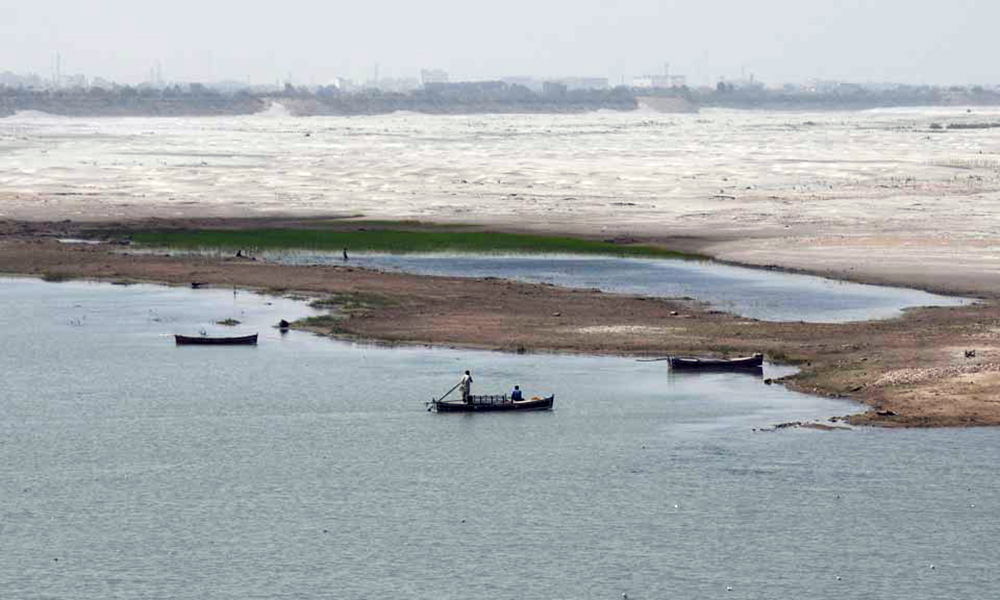
Pakistani farmers have voiced concern about future water supplies after India on Wednesday suspended the World Bank-mediated Indus Waters Tropy of 1960, which ensures water for 80% of Pakistan’s farms.
India said the suspension would last until “Pakistan credibly and irrevocably abjures its support for cross-border terrorism”.
This move comes after last week’s attack in Kashmir. India has accused Pakistan of having been involved, stating two of the three militants who attacked tourists and killed 26 men were from Pakistan.
Islamabad has denied any role and said “any attempt to stop or divert the flow of water belonging to Pakistan … will be considered as an Act of War”.
The treaty split the Indus and its tributaries between the nuclear-armed rivals.
Government officials and experts on both sides say India cannot stop water flows immediately, because the treaty has allowed it to only build hydropower plants without significant storage or dams on the three rivers allocated to Pakistan. But things could start changing in a few months, Reuters reported.
“We will ensure no drop of the Indus River’s water reaches Pakistan,” India’s water resources minister, Chandrakant Raghunath Paatil, said on X.
He did not respond to questions about the fears in Pakistan.
Two Indian government officials, who declined to be identified, said the country could within months start diverting the water for its own farms using canals while planning hydroelectric dams that could take four to seven years to finish.
Immediately, India will stop sharing data like hydrological flows at various sites of the rivers flowing through India, withhold flood warnings and skip annual meetings under the Permanent Indus Commission headed by one official each from the two countries, said Kushvinder Vohra, a recently retired head of India’s Central Water Commission.
“They will not have much information with them when the water is coming, how much is coming,” said Vohra, who was also India’s Indus Commissioner and now advises the government occasionally.
“Without the information, they cannot plan.”
And it is not just agriculture, a shortage of water will also hit electricity generation and potentially cripple the economy, economists say.
Vaqar Ahmed, economist and team lead with UK consulting firm Oxford Policy Management, said that Pakistan had underestimated the threat of India walking away from the treaty.
“India hasn’t got the kind of immediate infrastructure to halt the waterflows, especially during flood times, so this period creates a crucial window for Pakistan to address the inefficiencies in its water sector,” he said.
“There are a lot of inefficiencies, leakages.”
In recent years, Indian Prime Minister Narendra Modi’s government has been seeking to renegotiate the treaty and the two countries have been trying to settle some of their differences in the Permanent Court of Arbitration in the Hague over the size of the Kishenganga and Ratle hydroelectric plants’ water storage area, Reuters reported.
“We can now pursue our projects in free will,” said Vohra.
In a letter on Thursday, India told Pakistan that circumstances had changed since the treaty was signed, including population increases and the need for more cleaner energy sources, referring to hydropower.
Regional
Suspected chemical blast at Iran’s Bandar Abbas port kills at least 18, injures hundreds
President Masoud Pezeshkian ordered an investigation of the incident and sent to the site his interior minister, who said efforts were continuing to extinguish the fire and prevent it from spreading to other areas, read the report.
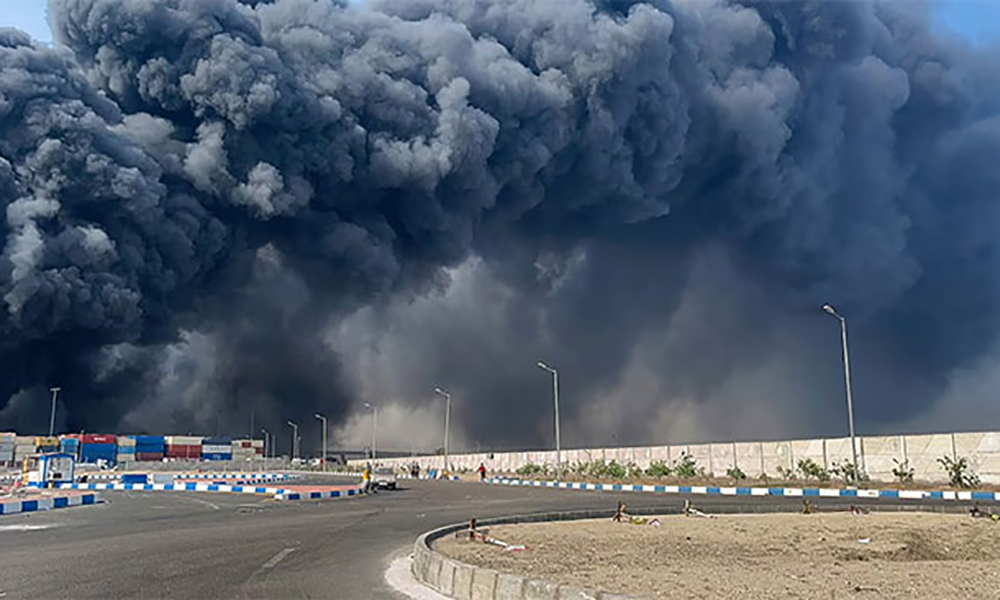
A huge blast probably caused by the explosion of chemical materials killed at least 18 people and injured more than 700 on Saturday at Iran’s biggest port, Bandar Abbas, Iranian state media reported.
The explosion, which hit the Shahid Rajaee section of the port, occurred as Iran began a third round of nuclear talks with the United States in Oman, but there was no indication of a link between the two events, Reuters reported.
Hossein Zafari, a spokesperson for Iran’s crisis management organisation, appeared to blame the explosion on poor storage of chemicals in containers at Shahid Rajaee.
“The cause of the explosion was the chemicals inside the containers,” he told Iran’s ILNA news agency.
“Previously, the Director General of Crisis Management had given warnings to this port during their visits and had pointed out the possibility of danger,” Zafari said.
However, an Iranian government spokesperson said that although chemicals had likely caused the blast, it was not yet possible to determine the exact reason.
President Masoud Pezeshkian ordered an investigation of the incident and sent to the site his interior minister, who said efforts were continuing to extinguish the fire and prevent it from spreading to other areas, read the report.
Iran’s official news channels aired footage of a vast black and orange cloud of smoke billowing up above the port in the aftermath of the blast, and an office building with its doors blown off and papers and debris strewn around.
Located near the strategic Strait of Hormoz, Shahid Rajaee port is Iran’s biggest container hub, handling a majority of the country’s container goods, according to state media.
The blast shattered windows within a radius of several kilometres and was heard in Qeshm, an island 26 kilometres (16 miles) south of the port, Iranian media said.
The semi-official Tasnim news agency posted footage of injured men lying on the road being tended to amid scenes of confusion.
State TV earlier reported that poor handling of flammable materials was a “contributing factor” to the explosion. A local crisis management official told state TV that the blast took place after several containers stored at the port exploded.
As relief workers tried to put out fires, the port’s customs officials said trucks were being evacuated from the area and that the container yard where the explosion occurred likely contained “dangerous goods and chemicals”. Activities at the port were halted after the blast, officials said.
A series of deadly incidents has hit Iranian energy and industrial infrastructure in recent years, with many, like Saturday’s blast, blamed on negligence.
They have included refinery fires, a gas explosion at a coal mine, and an emergency repair incident at Bandar Abbas that killed one worker in 2023.
Iran has blamed some other incidents on its arch-foe Israel, which has carried out attacks on Iranian soil targeting Iran’s nuclear programme in recent years and last year bombed the country’s air defences.
Tehran said Israel was behind a February 2024 attack on Iranian gas pipelines, while in 2020 computers at Shahid Rajaee were hit by a cyberattack. The Washington Post reported that Israel appeared to be behind that incident as retaliation for an earlier Iranian cyberattack, Reuters reported.
Israel has indicated it is nervous about the outcome of U.S.-Iran talks, demanding a full dismantlement of Iran’s nuclear programme. Tehran says the programme is used solely for peaceful purposes, while international observers say it is getting closer to being able to build a bomb.
There was no immediate comment from Israel’s military or Prime Minister Benjamin Netanyahu’s office when asked for comment on whether Israel was in any way involved in Saturday’s explosion.
Oil facilities were not affected by the blast on Saturday, Iranian authorities said.
The National Iranian Petroleum Refining and Distribution Company said in a statement it had “no connection to refineries, fuel tanks, distribution complexes and oil pipelines.”
-

 Sport5 days ago
Sport5 days agoSri Lanka A defeats Afghanistan A by 4 wickets in Abu Dhabi
-

 Latest News4 days ago
Latest News4 days agoAWCC activates new site in Nangarhar’s Kuz Kunar district
-

 Latest News4 days ago
Latest News4 days agoTarig Ali Bakheet and Japan’s Deputy Foreign Minister discuss Afghanistan’s situation
-

 Business4 days ago
Business4 days agoPakistan’s deputy PM discusses Trans-Afghan Railway Line project with Uzbek FM
-

 Climate Change5 days ago
Climate Change5 days agoPowerful earthquake of 6.2 magnitude shakes Istanbul
-

 Latest News5 days ago
Latest News5 days agoSpecial meeting will be held to launch Afghanistan–Russia joint commission, says Kabulov
-

 Latest News3 days ago
Latest News3 days agoAfghanistan’s medicine output reaches 900 types: Pharma Union
-

 Latest News4 days ago
Latest News4 days agoAfghan delegation to participate in Iran’s international expo


